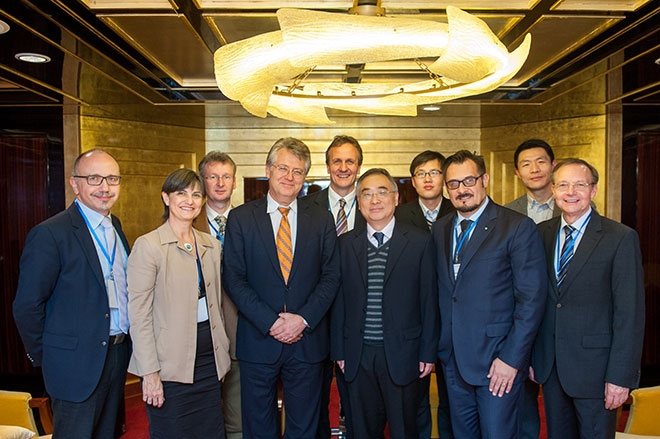The Nanjing Government Dialogue, held on 10th December in the Hanyue Lou hotel, saw the presentation of the latest national-scale European Business in China Position Paper 2014/2015, launched in September by the European Chamber of Commerce. Yet, there was really a tangible focus on our little pearl of the Yangtze river, as both sides vowed to increase the Nanjing focus as well as its appeal to foreign investors.
One step in the right direction is the individual paper for Nanjing. Previously, the national paper contained information about Shanghai, Tianjin and Nanjing combined, beginning next year a number of economic powerhouses will receive their individual position papers, with Shanghai taking the lead, while a shorter version of the national paper will be published alongside.
Speaking at the dialogue, Mr. Joerg Wuttke, President of EUCC, explained the reason for according Nanjing and other cities their very own paper.
“We think China resembles a continent more than a country; Jiangsu is nearly the size of Germany, and so it makes sense to break the paper down into a more local format. This will help facilitate communications between the chamber and the government but also put Nanjing on the map to get the attention of international companies.”
The new paper will further see an additional meeting of government and international business leaders in Nanjing, as both papers will be presented on separate occasions. This will further the goals of increased exchange, in which both the EUCC and the local government are eager to realise closer and more frequent interaction.
In a preliminary meeting, Mr. Zou Weike Deputy Director of Nanjing Investment Promotion Commission, spoke to Mr. Wuttke about his pride in light of the success of large international companies such as BSH and BASF in Nanjing and his desire for tightening the ties between China and the rest of the world.
“We are proud of the development and success in Nanjing of these international companies. To us they are not outsider companies, we view them as equal to local Nanjing businesses.
“We hope that other foreign businesses will follow the example of these companies and the government especially welcomes SMEs to come to Nanjing more.
“The government would further like to have more frequent exchanges than just one meeting a year. Therefore we have invited overseas, especially European, enterprises to participate in local events.”
All is looking promising for a closer relationship between China and international businesses in the coming year; a testament also to the tactful way in which the EUCC has handled its cooperation with the Chinese government.
Quite contrary to what one might think, the Chamber has found their expertise welcomed by local officials and even some of their rather direct criticisms do not fall on deaf ears.
“We possibly get listened to more easily than if we were a Chinese association. We could go elsewhere with our suggestions but because we are stakeholders we speak up; because we believe the system is able to change,” explained Mr. Wuttke at the event’s press conference.
Mr. Helmut Güsten, chairman of the EUCC Nanjing board added the importance was to not just stop at criticizing.
“We offer up solutions and ways how we can make things better.”
Just as importantly, most of the members of the working groups involved in the yearly paper are Chinese nationals, whose local knowledge in combination with the experience of a number of international company leaders makes a very strong case.
A major point of discussion of the day and yet again an illustration that the EUCC is not afraid to speak up on sensitive issues was the question of the Internet.
While the country has in place some of the best Internet equipment by international standards, in terms of speed it is probably one of the slowest internet connections in a world. In international benchmarking of 1996 it was four times slower than the world leader at the time, Korea, and as many of us notice on a daily basis, over the past two decades, things have not much improved.
Outlining key concerns of the paper to an audience comprised of over 100 members of the EUCC, local and international business leaders and government figureheads, Mr. Wuttke made it very clear that the continuous control of the Internet is creating very real economic losses to the country.
“There is too much filtering going on especially for legal documents, so service providers or architects can’t send their documents abroad.
“I think there is a hidden opportunity for GDP growth here. An example is Chengdu, which is home to some of the best cartoonists in the world but they can’t get their creations out into the world and go unrecognized.”
The paper touches on a large range of issues from implementing environmental laws, which are one of the most stringent in the world, yet find themselves being ignored due to rampant corruption, to China’s relationship with the world.
Despite a few points of criticism the overall tone was positive, with Wuttke commending the government for its recent actions, such as the announcement by the state council on the 9th December that it intends to abolish preferential treatment in order to establish a fairer competition for the market across China.
Wuttke applauded this move citing a Royal Bank study that proclaimed if variances between the different Chinese regions are knocked down, this could generate 1-2 percent additional GDP entirely on its own.
While especially the North-Western regions of China, which have in the past been heavily subsidized by the state, will be hit by this ruling, for Nanjing and Jiangsu there could not be better news, as the new law will help more developed regions and clusters to make them more competitive.
With all eyes on Nanjing and preferential new laws, it seems a bright economic future lies ahead for our city of choice. Here’s to a successful 2015.









